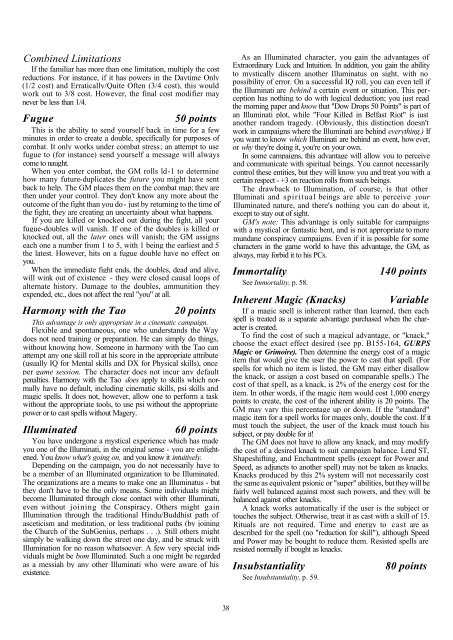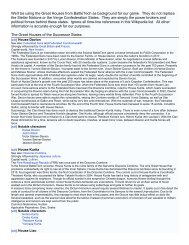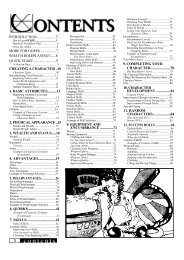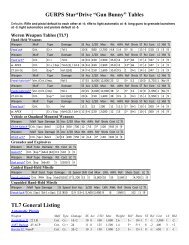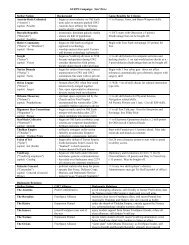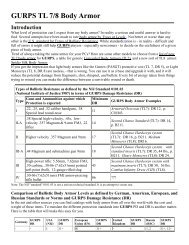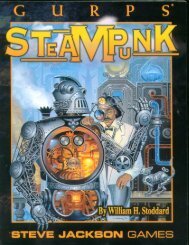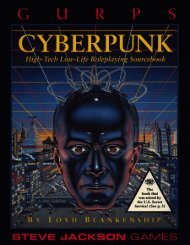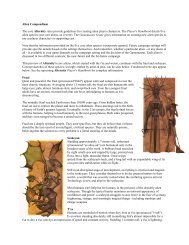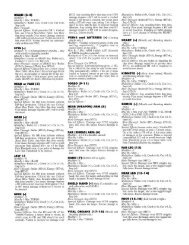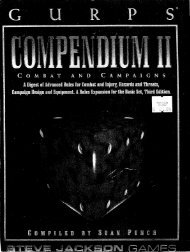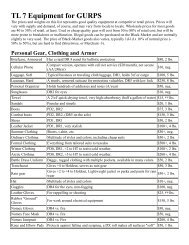GURPS - Compendium 1..
GURPS - Compendium 1..
GURPS - Compendium 1..
Create successful ePaper yourself
Turn your PDF publications into a flip-book with our unique Google optimized e-Paper software.
Combined Limitations<br />
If the familiar has more than one limitation, multiply the cost<br />
reductions. For instance, if it has powers in the Daytime Only<br />
(1/2 cost) and Erratically/Quite Often (3/4 cost), this would<br />
work out to 3/8 cost. However, the final cost modifier may<br />
never be less than 1/4.<br />
Fugue<br />
50 points<br />
This is the ability to send yourself back in time for a few<br />
minutes in order to create a double, specifically for purposes of<br />
combat. It only works under combat stress; an attempt to use<br />
fugue to (for instance) send yourself a message will always<br />
come to naught.<br />
When you enter combat, the GM rolls ld-1 to determine<br />
how many future-duplicates the future you might have sent<br />
back to help. The GM places them on the combat map; they are<br />
then under your control. They don't know any more about the<br />
outcome of the fight than you do - just by returning to the time of<br />
the fight, they are creating an uncertainty about what happens.<br />
If you are killed or knocked out during the fight, all your<br />
fugue-doubles will vanish. If one of the doubles is killed or<br />
knocked out, all the later ones will vanish; the GM assigns<br />
each one a number from 1 to 5, with 1 being the earliest and 5<br />
the latest. However, hits on a fugue double have no effect on<br />
you.<br />
When the immediate fight ends, the doubles, dead and alive,<br />
will wink out of existence - they were closed causal loops of<br />
alternate history. Damage to the doubles, ammunition they<br />
expended, etc., does not affect the real "you" at all.<br />
Harmony with the Tao<br />
20 points<br />
This advantage is only appropriate in a cinematic campaign.<br />
Flexible and spontaneous, one who understands the Way<br />
does not need training or preparation. He can simply do things,<br />
without knowing how. Someone in harmony with the Tao can<br />
attempt any one skill roll at his score in the appropriate attribute<br />
(usually IQ for Mental skills and DX for Physical skills), once<br />
per game session. The character does not incur any default<br />
penalties. Harmony with the Tao does apply to skills which normally<br />
have no default, including cinematic skills, psi skills and<br />
magic spells. It does not, however, allow one to perform a task<br />
without the appropriate tools, to use psi without the appropriate<br />
power or to cast spells without Magery.<br />
Illuminated<br />
60 points<br />
You have undergone a mystical experience which has made<br />
you one of the Illuminati, in the original sense - you are enlightened.<br />
You know what's going on, and you know it intuitively.<br />
Depending on the campaign, you do not necessarily have to<br />
be a member of an Illuminated organization to be Illuminated.<br />
The organizations are a means to make one an Illuminatus - but<br />
they don't have to be the only means. Some individuals might<br />
become Illuminated through close contact with other Illuminati,<br />
even without joining the Conspiracy. Others might gain<br />
Illumination through the traditional Hindu/Buddhist path of<br />
asceticism and meditation, or less traditional paths (by joining<br />
the Church of the SubGenius, perhaps . . .). Still others might<br />
simply be walking down the street one day, and be struck with<br />
Illumination for no reason whatsoever. A few very special individuals<br />
might be bom Illuminated. Such a one might be regarded<br />
as a messiah by any other Illuminati who were aware of his<br />
existence.<br />
As an Illuminated character, you gain the advantages of<br />
Extraordinary Luck and Intuition. In addition, you gain the ability<br />
to mystically discern another Illuminatus on sight, with no<br />
possibility of error. On a successful IQ roll, you can even tell if<br />
the Illuminati are behind a certain event or situation. This perception<br />
has nothing to do with logical deduction; you just read<br />
the morning paper and know that "Dow Drops 50 Points" is part of<br />
an Illuminati plot, while "Four Killed in Belfast Riot" is just<br />
another random tragedy. (Obviously, this distinction doesn't<br />
work in campaigns where the Illuminati are behind everything.) If<br />
you want to know which Illuminati are behind an event, however,<br />
or why they're doing it, you're on your own.<br />
In some campaigns, this advantage will allow you to perceive<br />
and communicate with spiritual beings. You cannot necessarily<br />
control these entities, but they will know you and treat you with a<br />
certain respect - +3 on reaction rolls from such beings.<br />
The drawback to Illumination, of course, is that other<br />
Illuminati and spiritual beings are able to perceive your<br />
Illuminated nature, and there's nothing you can do about it,<br />
except to stay out of sight.<br />
GM's note: This advantage is only suitable for campaigns<br />
with a mystical or fantastic bent, and is not appropriate to more<br />
mundane conspiracy campaigns. Even if it is possible for some<br />
characters in the game world to have this advantage, the GM, as<br />
always, may forbid it to his PCs.<br />
Immortality<br />
See Immortality, p. 58.<br />
Inherent Magic (Knacks)<br />
140 points<br />
Variable<br />
If a magic spell is inherent rather than learned, then each<br />
spell is treated as a separate advantage purchased when the character<br />
is created.<br />
To find the cost of such a magical advantage, or "knack,"<br />
choose the exact effect desired (see pp. B155-164, <strong>GURPS</strong><br />
Magic or Grimoire). Then determine the energy cost of a magic<br />
item that would give the user the power to cast that spell. (For<br />
spells for which no item is listed, the GM may either disallow<br />
the knack, or assign a cost based on comparable spells.) The<br />
cost of that spell, as a knack, is 2% of the energy cost for the<br />
item. In other words, if the magic item would cost 1,000 energy<br />
points to create, the cost of the inherent ability is 20 points. The<br />
GM may vary this percentage up or down. If the "standard"<br />
magic item for a spell works for mages only, double the cost. If it<br />
must touch the subject, the user of the knack must touch his<br />
subject, or pay double for it!<br />
The GM does not have to allow any knack, and may modify<br />
the cost of a desired knack to suit campaign balance. Lend ST,<br />
Shapeshifting, and Enchantment spells (except for Power and<br />
Speed, as adjuncts to another spell) may not be taken as knacks.<br />
Knacks produced by this 2% system will not necessarily cost<br />
the same as equivalent psionic or "super" abilities, but they will be<br />
fairly well balanced against most such powers, and they will be<br />
balanced against other knacks.<br />
A knack works automatically if the user is the subject or<br />
touches the subject. Otherwise, treat it as cast with a skill of 15.<br />
Rituals are not required. Time and energy to cast are as<br />
described for the spell (no "reduction for skill"), although Speed<br />
and Power may be bought to reduce them. Resisted spells are<br />
resisted normally if bought as knacks.<br />
Insubstantiality<br />
See Insubstantiality, p. 59.<br />
80 points<br />
38


